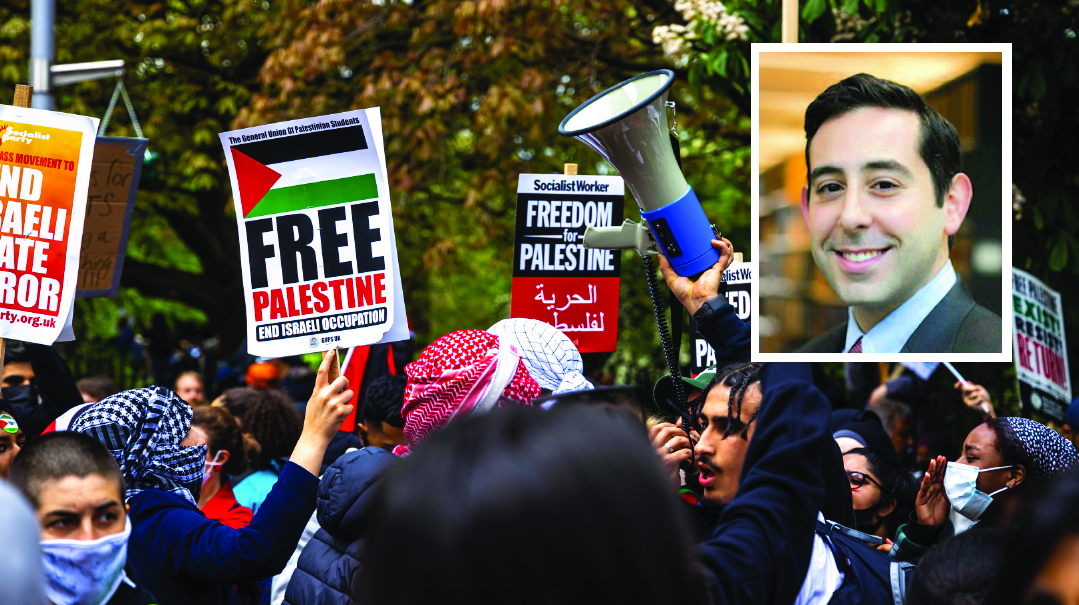A Postwar Debriefing
| June 1, 2021To paraphrase the Mishnah, it is so important to know how to respond to these heresies

Over the last few years, you have probably seen some version of the following set of claims, often used during the height of a conflict to justify terrorist actions in order to make murder understandable, if not acceptable: Israel is an illegal occupier, practicing apartheid, and — as if that weren’t enough — its military responses are completely disproportionate and amount to genocide.
That is quite the list of accusations, and of course, every word of that narrative is nonsense. Occupation, apartheid, proportionality, and genocide are all actual legal terms with fixed meanings and definitional criteria that do not apply to Israel. You might even be excused for thinking that just engaging in this conversation gives unnecessary credence to these falsehoods.
But the truth is that we let these claims go unchallenged at our peril. Study after study has shown that this kind of inflammatory, discriminatory, anti-Zionist rhetoric is actually dangerous, and leads directly to the kinds of anti-Semitic attacks against innocent Jewish people and institutions that we are seeing around the world.
That is why, to paraphrase the Mishnah, it is so important to know how to respond to these heresies.
1) Israel is an illegal occupying power
To begin, while the history of Israel could fill a tome, the modern legal history is simple. In 1922 the League of Nations Mandate for Palestine officially established an area in the Middle East to be a national home for the Jewish People and entrusted it to Great Britain. The land was not given to the Jews, nor was it stolen from anyone else. Jewish people came from around the world to buy and cultivate land in order to further expand the existing Jewish communities that had remained in Israel as a continuous presence since Biblical times and throughout the exiles.
As Winston Churchill, then secretary of state for the colonies, explained, “When it is asked what is meant by the development of the Jewish National Home in Palestine, it may be answered that it is not the imposition of a Jewish nationality upon the inhabitants of Palestine… but the further development of the existing Jewish community... [I]n order that this community should have the best prospect of free development… it is essential that it should know that it is in Palestine as of right and not on sufferance.”
Under Article 25 of the Mandate, Britain was entitled to change the terms in the territory east of the Jordan River: it did so, and gave 77 percent of the original Mandatory land to what is now Jordan. When the United Nations was formed, it affirmed the existing arrangement, and proposed a partition plan for the remaining 23 percent. That plan would have created two states, and revised the existing Mandatory borders to divide between an independent Israel and an independent Palestine.
The Arab leaders, however, rejected the plan, and so the extant Mandate lines were left intact. Israel declared independence and was recognized as an emerging country by the UN. Under the international legal doctrine of Uti possidetis juris, emerging states presumptively inherit their pre-independence administrative boundaries or borders. International law then dictates that Israel, which remains the only country that has ever emerged from the area in question, inherited the boundaries of the Mandate of Palestine as they existed in May 1948.
Israel was attacked by five Arab nations, and for 19 years, two of the invading Arab armies, Jordan and Egypt, occupied territory that they had taken through illegal aggression — the West Bank and the Gaza Strip, respectively. In 1967, Israel regained sovereignty over those territories in another defensive war. To quote former State Department legal advisor Stephen Schwebel, who later headed the International Court of Justice in the Hague: “Where the prior holder of territory had seized that territory unlawfully, the state which subsequently takes that territory in the lawful exercise of self-defense has, against that prior holder, better title.”
So Israel has both title and sovereignty. Tough political question? Sure. Illegal occupation? Surely not. The occupation myth relies on the common mistaken belief that resolutions of the UN General Assembly, an overtly political body, are legally binding. They aren’t.
2) Israel is an apartheid state
The next term of art that is often abused when it comes to slandering Israel is the international-law crime of apartheid. There are a couple of accepted definitions of apartheid, which mean basically the same thing: For example, the International Convention on the Suppression and Punishment of the Crime of Apartheid states that:
“the crime of apartheid”... shall apply to the following inhumane acts committed for the purpose of establishing and maintaining domination by one racial group of persons over any other racial group of persons and systematically oppressing them.
There are any number of reasons why Israel is not an apartheid state; for example, Israeli Arab citizens have full and equal rights, and have enjoyed positions in the highest levels of every branch of government, including the legislative branch (the Knesset), the executive branch (the Israeli cabinet), and the judicial branch (the High Court). But even ignoring those facts, remember that by definition, apartheid involves inhumane acts committed with the intention of maintaining a particular regime.
Israel has repeatedly, over 30 times now, offered plans for peace. And while one might argue that any one, or two, or ten of them were not great deals for the Palestinians, some of them were overly generous, and some, including the Clinton Parameters, were even supported by much of the Arab world.
Consider this: Israel (legitimately) gained a total of 26,178 square miles of territory in the 1967 Six Day War. To date, it has given back over 23,871 square miles, or 87 percent, of that territory. At various times in recent history, Israel has offered up to 99.3 percent of the remaining disputed territory in exchange for peace. Each time, the Palestinians refused. The bottom line, though, is that by definition, there cannot be apartheid when one group keeps trying negotiate a lasting peace in order to end the status quo, not maintain it.
Still, the allegation of apartheid and systematic oppression gets repeated until it becomes a de facto justification for the launch of violence against innocents. And then, when Israel responds, you will inevitably be confronted by the next myth.
3) Israel’s response was “disproportionate”
Take the most recent outbreak: A private civil court case over unpaid rent in Sheikh Jarrah (that did not actually involve the State of Israel as a party) was spun as an example of ethnic cleansing that could be blamed on the Israeli government. In fact, Israel did everything it could to de-escalate the tension, including taking the unprecedented step of asking the court to postpone the proceedings.
But empowered by the international support they were receiving for their story, Hamas and other terrorist groups started firing thousands of rockets at innocent people in densely populated cities. Israel managed to block the majority (but not all) of those rockets, and responded by striking military targets that Hamas was using to attack them.
Israel worked hard to prevent the death of innocents so that the number of Palestinian civilian casualties was actually remarkably low — according to some experts, Operation Guardian of the Walls was the most accurate precision-bombing campaign in world history. But none of that mattered to the Hamas-enabling pundits, who once again called Israel’s actions “disproportionate,” for the simple reason that there were more dead Palestinian civilians than Israelis. They also complained that the fight was not fair because Israel’s technology is far superior, while Hamas kept on accidentally shooting its own people.
Perhaps it would feel “fairer” to the commentators in question if there were more dead Jews. But that does not give their opinion any moral worth or their heavy accusations any merit; disproportionate attacks are war crimes, after all, and such allegations should not be made lightly.
Per Article 8(2)(b)(4) of the Rome Statute, the principle of proportionality forbids attacks in which expected civilian casualties will be excessive in relation to the anticipated military advantage gained. It has nothing to do with the relative number of people killed on both sides, and the reason for that is clear: When you judge the appropriateness of an attack based on the number of people who died, you do not protect civilians, you incentivize human shields. Here’s how:
Israel anticipates that its airstrikes will gain the important advantage of ending Hamas’s rocket attacks. The law recognizes that the possibility of civilian casualties is an unfortunate but expected element of even lawful attacks; it simply requires Israel to try and minimize the number, which the IDF admirably does. Hamas, however, knows that people misunderstand what proportionality means and assume (for no good reason) that it has something to do with the relative number of dead bodies on each side. Hamas leaders consistently take advantage of this dangerous misconception by exploiting their own civilian population — including and especially women and children — and purposely placing them in harm’s way. They do this to try to artificially inflate the body count in order to make things look even more “disproportionate” to an undiscerning media.
That is why Hamas’s operatives surround themselves with Palestinian civilians, why they store weapons in schools and hospitals, and why they fire rockets from civilian structures in populated areas. Because under the kind of effects-based, non-legal analysis uneducated people tend to use, this sickening behavior is rewarded — even as Hamas flagrantly ignores the rules of war.
For the record, the conflict was asymmetrical, not disproportionate, and that is because Israel cares about and invests in protecting its citizens, while Hamas does not. Asymmetry and disproportionality are not the same thing, no matter how many celebrities confuse them. One is a statement of numerical fact, and the other is a war crime.
But even these allegations do not go far enough in the eyes of Israel’s critics, and so a new popular pastime is to accuse Israel of committing genocide against the Palestinians. Which leads us to the next myth.
4) Israel is committing genocide against the Palestinian people
This is really nothing more than a somewhat uninspired update on the classic blood libel, and is so deranged that it would be laughable if it were not so incredibly dangerous. Fortunately, it is also perhaps the easiest to refute. The Convention on the Prevention and Punishment of the Crime of Genocide says that genocidal acts are “committed with intent to destroy, in whole or in part, a national, ethnical, racial, or religious group, as such.”
The problem is that (again setting aside the complete lack of evidence for such a charge) the irrefutable math here tells a very different story. Recall that one of the chief complaints in the previous argument about proportionality was that Israel is so technologically superior if the IDF wanted they could easily destroy the whole of Gaza and the West Bank in five minutes. And yet, since 1967, the Palestinian Arab population has actually increased by 387 percent. If Israel is perpetrating a genocide against a defenseless people, then it is historically, awfully bad at it.
If you are curious as to what a call for genocide does look like, Hamas’s founding charter contains the following paragraph:
The Day of Judgment will not come about until Muslims fight Jews and kill them. Then, the Jews will hide behind rocks and trees, and the rocks and trees will cry out: “O Muslim, there is a Jew hiding behind me, come and kill him.”
For reference, this call to kill Jews around the world comes in addition to the clause vowing the obliteration of the State of Israel. So, to sum up, Jews do have the ability to destroy the other side, but they demonstrably don’t use it. Their enemies do not have that power (thank G-d), but openly proclaim that they would, if they could.
In other words, this is just another instance of the pot calling the kettle genocidal.
And so the next time someone tells you that Israel has “clearly violated international law,” ask them which law exactly, and if they can please stop and properly define it before going further. Because when we don’t, and when we let lies build on imprecision, people end up maligning the innocent, justifying murder, and giving terrorists a pass.
Rabbi Dr. Moshe (Mark) Goldfeder is an international lawyer and director of the National Jewish Advocacy Center
(Originally featured in Mishpacha, Issue 863)
Oops! We could not locate your form.













